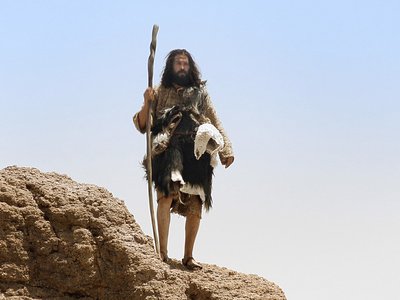Thoughts for the Day
Tuesday, 10th December 2024: Advent, Day 10 (The Forerunner)
Forerunner Prophecy Isaiah Isaiah 40 Prophet Malachi
Reading : Verses from Isaiah, Chapter 40

Comfort, O comfort my people,
says your God.
Speak tenderly to Jerusalem,
and cry to her
that she has served her term,
that her penalty is paid,
that she has received from the Lord’s hand
double for all her sins.
A voice cries out:
‘In the wilderness prepare the way of the Lord,
make straight in the desert a highway for our God.
Every valley shall be lifted up,
and every mountain and hill be made low;
the uneven ground shall become level,
and the rough places a plain.
Then the glory of the Lord shall be revealed,
and all people shall see it together,
for the mouth of the Lord has spoken.’
A voice says, ‘Cry out!’
And I said, ‘What shall I cry?’
All people are grass,
their constancy is like the flower of the field.
The grass withers, the flower fades,
when the breath of the Lord blows upon it;
surely the people are grass.
The grass withers, the flower fades;
but the word of our God will stand for ever.
Get you up to a high mountain,
O Zion, herald of good tidings;
lift up your voice with strength,
O Jerusalem, herald of good tidings,
lift it up, do not fear;
say to the cities of Judah,
‘Here is your God!’
See, the Lord God comes with might,
and his arm rules for him;
his reward is with him,
and his recompense before him.
He will feed his flock like a shepherd;
he will gather the lambs in his arms,
and carry them in his bosom,
and gently lead the mother sheep.
(Lectionary, New Revised Standard Version)
Thoughts
During Advent we shall look at the people, places and symbols that invite us to prepare for the coming of the Christ-child at Christmas. They will not necessarily occur in the right order! Today we look at 'The Forerunner' .
We looked recently at the Prophet Malachi, who prophesied that a messenger was coming to warn us about a time often called the "Day of the Lord" when God would return to settle His accounts with His people. Isaiah's take on this same theme is slightly different. First he starts with a message of hope from God, and he seems to refer to a time of calamity that has been settled. Depending on whether there was more than one writer of the book of Isaiah, this could be the Assyrian advances which overcame the northern kingdom and besieged Jerusalem or much later, the ending of the Babylonian exile. Either way Isaiah speaks of God's return to help His people.
At the time of Jesus centuries later, when the people were oppressed by the rule of Rome, this hope of God's return was vibrant. At a time when the Romans ruled about a quarter of the world's population the people of Palestine looked for a Messiah to come and save them. They understood Isaiah's prophecy of a 'forerunner'. After all they were accustomed to have soldiers travelling the length and breadth of the Republic heralding news, while others kept the roads clear and well repaired. The forerunner would need to make sure that the people, rather like a highway, were prepared for God's arrival.
So when John the Baptist appeared quoting Isaiah's old prophecy they wondered if it was about to come true. John came out of the desert like a wild man, warning the people that God was coming 'with might'. He called them a "brood of vipers" and demanded they give away their belongings and be baptized. Though they were shocked many obeyed (Luke 3.1-18). John was to be the 'forerunner' who came to prepare the people's hearts for the coming of Jesus the Messiah. This Advent we need to be aware of the same message, that our God is coming, and use this time to get ready for Him spiritually.
Prayer
Lord Jesus Christ,
You sent Your forerunner John,
to prepare the people for Your arrival,
but despite his wonderful work
many would still not recognise You
in the humble baby of Bethlehem
or the carpenter's son from Nazareth.
May we use this time of Advent
as a time of preparation for ourselves,
to look again at what is important spiritually,
and make ready for the anniversary
of Your birth at Christmas.
Amen.
You might like to listen to the words of Isaiah from Handel's 'Messiah':
- Comfort Ye, and Every Valley (Andrew Goodwin)
You might like to look at this definition of a 'forerunner':